

Want to Reduce Brain Fog And Improve Clear Thinking? Give up These Things Immediately. Photo from francescoch / Getty Images Mental fog is often described as a “cloudy-headed” feeling.
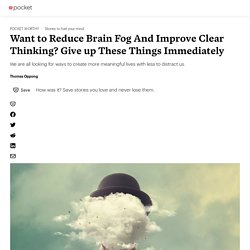
Common conditions of brain fog include poor memory, difficulty focusing or concentrating, and struggling with articulation. Imagine if you could concentrate your brain power into one bright beam and focus it like a laser on whatever you wish to accomplish. Many people struggle to concentrate. And when you can’t concentrate, everything you do is harder and takes longer than you’d like. Give Up the Clutter Mess creates stress. There’s a strong link between your physical space and your mental space. Clutter is bad for your mind and health. When the book, The Life-Changing Magic of Tidying Up: The Japanese Art of Decluttering and Organizing, by Marie Kondo became a best-seller, it wasn’t too surprising. We are all looking for ways to create more meaningful lives with less to distract us.
Start decluttering today in small, focused bursts. Multi-Tasking Doesn’t Work Task switching has a severe cost. The Wisdom Of Elon Musk Applied To Retirement And Everyday Life. Simple Trick To Help Optimize Your Retirement In Any Market Elon Musk said,” One of the biggest traps for smart engineers is optimizing something that shouldn’t exist.”
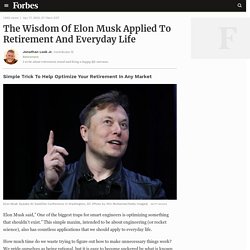
This simple maxim, intended to be about engineering (or rocket science), also has countless applications that we should apply to everyday life. How much time do we waste trying to figure out how to make unnecessary things work? We pride ourselves as being rational, but it is easy to become suckered by what is known as the sunk cost fallacy. This fallacy states that individuals continue with dead-end endeavors (or behaviors) because they have already invested some resources (money, time, effort) and are stubbornly unwilling to change paths or cut their losses. Said another way, we humans can’t stand being wrong. How To Be Happier And More Purposeful. I’ve spent the last 16 years working with CEOs and entrepreneurs to help them get clear on their purpose, get great people around them, execute their decisions and enjoy their life in the process.
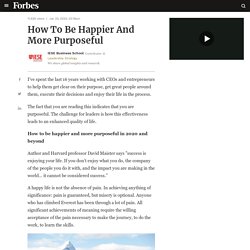
The fact that you are reading this indicates that you are purposeful. The challenge for leaders is how this effectiveness leads to an enhanced quality of life. How to be happier and more purposeful in 2020 and beyond Author and Harvard professor David Maister says "success is enjoying your life. If you don’t enjoy what you do, the company of the people you do it with, and the impact you are making in the world… it cannot be considered success.” A happy life is not the absence of pain. Want a Happy Relationship? The World's 'Most Comprehensive Study' Says It Comes Down to Just 1 Thing (Plus: How to Get It if You Don't Have It) Study after study proves people who have good relationships--especially with their spouse or significant other--are most likely to achieve happiness.
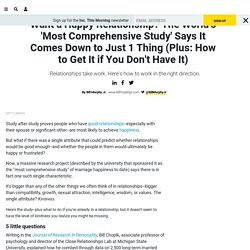
But what if there was a single attribute that could predict whether relationships would be good enough--and whether the people in them would ultimately be happy or frustrated? Now, a massive research project (described by the university that sponsored it as the "most comprehensive study" of marriage happiness to date) says there is in fact one such single characteristic. It's bigger than any of the other things we often think of in relationships--bigger than compatibility, growth, sexual attraction, intelligence, wisdom, or values. The single attribute?
Kindness. The Unchained Husband: 3 Tips to Freedom in Your Relationship. I'm taking Yale's class on happiness, and halfway through, these 4 tricks are already working - Business Insider. Why I Hope to Die at 75 - The Atlantic - Pocket. Seventy-five.
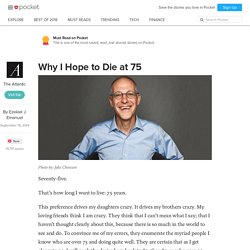
That’s how long I want to live: 75 years. This preference drives my daughters crazy. It drives my brothers crazy. My loving friends think I am crazy. They think that I can’t mean what I say; that I haven’t thought clearly about this, because there is so much in the world to see and do. I am sure of my position. But here is a simple truth that many of us seem to resist: living too long is also a loss. By the time I reach 75, I will have lived a complete life. Let me be clear about my wish.
I am talking about how long I want to live and the kind and amount of health care I will consent to after 75. I reject this aspiration. What are those reasons? In the early part of the 20th century, life expectancy increased as vaccines, antibiotics, and better medical care saved more children from premature death and effectively treated infections. The American immortal desperately wants to believe in the “compression of morbidity.” 3 tips to slowing down cognitive decline. The Biggest Wastes Of Time We Regret When We Get Older - Lifehacker - Pocket.
We spend a lot of energy looking for shortcuts to save time, and sure, those shortcuts add up.
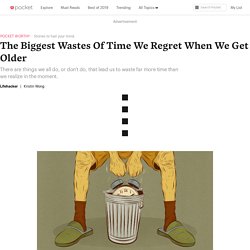
But when I look back, my biggest time regrets aren't spending too much time on Twitter or mismanaging my daily tasks. Those are bad habits, but there are bigger, more systematic time wasters that have really gotten in the way. Fixing these will free up a massive amount of time and energy. Not Asking for Help My first week on my first job out of university, my boss handed me a huge spreadsheet. Finally, my coworker came in, and I confessed I had no idea what to do. It was harsh, but true. Similarly, asking for help is a great way to, well, get help. 2-3 sentences of honest appreciation. Here's another way to look at it: if you're not asking for help, you're probably not challenging yourself enough. Weekly planning. Productivity advice.